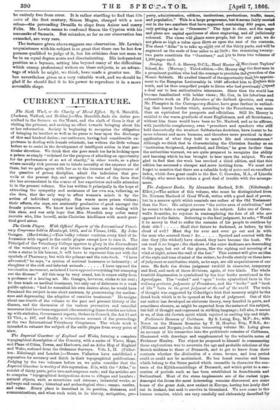The Judgment Books. By Alexander Macleod, D.D. (Edinburgh:
Elliot.)—The author of this volume, who must be distinguished from Dr. Norman Macleod of -Good Words, -writes with a good deal of power, but in a narrow spirit -which reminds one rather of the Old Testament than the New. His subject covers "the entire area of retribution," and he seems to take a savage pleasure in his subject. Like one of Crom- well's In:amides, he rejoices in contemplating the fate of all who are opposed to the Saints. Referring to the final judgment, he asks, "Would. it be mercy in God to suffer the enemies of his people to continue by their side 9 Shall their future be darkened, as before, by this
cloud of evil? Must they for ever and ever go out and in with
the men who scorned them ? e‘c Spotted and scarred with the sins they (the wicked) have sinned, they have become the book. We can read it no longer ; the shadows of the outer darkness are descending on its page, but out of the gloom, like the sighing and moaning of a wind at night, arises the wail of the lost." This extract will give an idea of the style and tone of mind of the writer; he dwells sternly on those laws of judgment or retribution which, as he says, are old acquaintances of our' race. He finds the divine judgment twofold in character, temporary and final, and each of these divisions, again, of two kinds. The whole fourfold dispensation is symbolized by the fear books mentioned in the Apocalypse. The "sealed" and "-open" books symbolized facts in the ordinary prelusive judgments of Providence, and the " books " and "book of life" Lots in the great judgment at the end of the world. The train_ of thought was suggested by Coleridge's hint that memory might be the dread book which is to be opened-at the day of judgment. Oat of this our author has developed an elaborate theory, 'very fanciful in parts, and sometimes obscure, as might be _expected from the nature of the subject, but full of thought and expressed in striking language; full also, it seems to us, of that old.Jewish spirit which rejoiced in smiting hip and thigh.






























 Previous page
Previous page